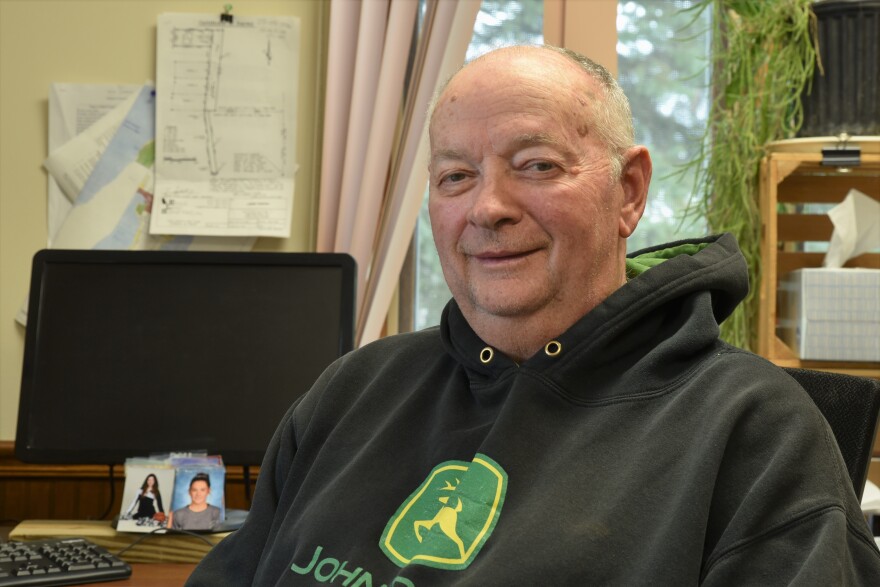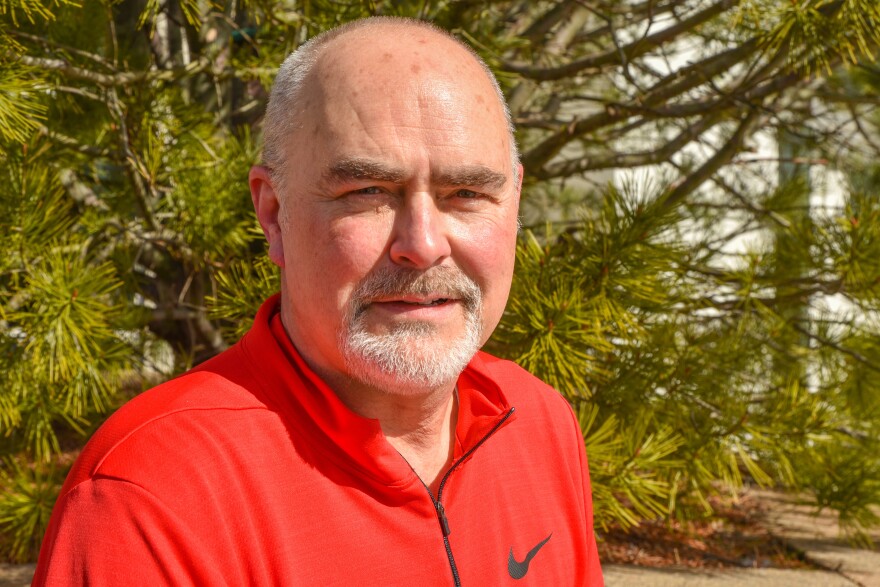Like other inland lakes in the area, residents around Elk Lake in Antrim County are seeing changes in the water.
Robin Sims and her husband spend the winters in Florida and summers at their place on the lake. She said in the spring three years ago, he called her out to the dock.
“I went out there and he says, ‘Look at this.’ He says, ‘Something's not right here. We have things growing that shouldn't be growing,’” as he pointed to vegetation in the water.
The crystal-clear blue water of Elk Lake and the neighboring Torch Lake have never had plants growing on the bottom or algal blooms floating on top until recently.

Meanwhile, as early as 2008, E.coli bacteria was at alarming levels in Elk Lake. The Village of Elk Rapids was no exception. It prompted the municipality to build a new sewer system to replace its old wastewater plant and eliminate more of the private septic systems in the village and the surrounding township. E.coli is associated with feces and is an indicator of other possible pathogens in the water.
At the time, some Elk Rapids residents resisted the move to build a new sewer system. They blamed geese pooping or agricultural runoff for the high E.coli levels. But the new plant was built and went into operation in 2016.
A similar dynamic is now playing out in nearby Milton Township – where some residents oppose a plan to explore options for treating wastewater.

Septic systems are common around much of Elk Lake and many other lake communities. If they’re maintained, they usually manage to keep bacteria and viruses in check. But, failing systems can allow contaminated water to seep through the earth into nearby bodies of water.
Robin Sims began researching the issue, and she came to the conclusion the most likely culprit causing plant growth in Elk Lake in Milton Township was septage leaching from faulty systems. She started a campaign to persuade the township board to hire consultants to perform a feasibility study.
The Township board voted that down. Some of the residents did not want to start down a path that could cost them thousands of dollars to hook up to a sewer system.
“No one's asking you to get out there and lay pipe. We're just wanting to get answers, options and costs,” Sims argued.
The Elk-Skegemog Lakes Association doesn’t think the cause of the vegetation that’s been appearing in recent years is faulty septic systems. An effort to determine what’s causing an increase in golden-brown algae is spearheaded by Three Lakes Association in Antrim County. University researchers have been working on the problem.
“They have not, at this point, determined what the cause is. It's unlikely that it is leaking septic systems and they are exploring other causes, other links,” said Bob Campbell, the president of the Elk-Skegemog Lakes Association.
Campbell says he doesn’t doubt there are some failing septic systems on Elk Lake as there are on lakes all over Michigan. In time he’d like to see a centralized wastewater treatment facility. But the evidence is not pointing to that causing the vegetation growth.
Earlier this week, the Great Lakes News Collaborative documented how rural communities across Michigan are struggling to maintain safe drinking water as population loss, poverty, and longstanding disinvestment leave public water systems deteriorating or in disarray. But, in a handful of booming vacation communities, growth poses its own water quality problems.
More homes with more bathrooms
Elk Lake has changed a lot over the decades. Milton Township Supervisor Lon Bargy remembers when roads to the lake were just two-track lanes. Very few people lived on the lake year-round. Most visited their cabins for the summer. He said now those cabins have been rebuilt to be retirement homes.

“Oh, we got a lot of them. We've got a couple, four or five bathrooms, Bargy said. “And if they're staying here year-round … you can't use just a little septic system anymore.”
Not only are houses getting bigger, but over the decades a lot more homes have been built. Houses completely line the shores of Elk Lake, much like they do along many of the lakes in the region.
Bargy favors a feasibility study to determine the best route to go for the health of Elk Lake and the wellbeing of its residents.
He said back in the day, a septic system could be as crude as a pipe connected to a couple of 55-gallon steel drums full of rock, and then released into the lake.
The township does have a law requiring a septic system inspection when a house sells. But many of the old homes have been in the same family for decades and have never been inspected to see whether their septic systems are working properly.
A worker at a local septage hauling company who didn’t want to give his name because he wasn’t authorized to speak for the business, said because of point of sale inspections, they don’t run into rundown, faulty systems as often as they once did when called out to pump out a septic tank.
The idea of how to deal with human waste has evolved over the decades.

“When we went from the outhouse to indoor plumbing, we added septic tanks to retain the solids, to keep a tile from blocking. And typically that tile went to a ditch, a drain, a stream, a lake, you know a river,” said Dale Ladouceur, an environmental quality specialist with the Onsite Wastewater Program within the Department of Environment, Great Lakes, and Energy.
But things changed. Oil and chemical spills in the Rouge River led duck hunters to pick up dead ducks by the thousands and haul them to Lansing to dump them on the Capitol lawn. Michigan and the nation began looking at ways to clean up water, and that included better ways to handle human waste.
Today, a septic tank separates solids to be pumped out every few years. The remaining liquid is distributed to multiple perforated pipes called lateral lines. They’re in trenches or a pit filled with gravel or stone to give aerobic bacteria the opportunity to further break down organic material in what’s called a drain field.
Ladouceur said as the U.S. Environmental Protection Agency concluded 25 years ago, onsite wastewater systems – septic systems – are a practical solution if a centralized sewer system is not available.
“Adequately operated and maintained decentralized systems are an option for rural areas across the country. There is rationale to move to a centralized system for sites that are typically around lakes. Typically, small sites don't have a lot of options to expand,” he explained.
In a previous report, one of the state’s leading water experts said even a new septic system is not without problems. Unlike a sewer system, septic systems do not disinfect. Bacteria and viruses can escape into the environment.
“Anytime anybody gets sick, these organisms are going into our septic tanks. These are small enough to get through the soil in many cases, so they can reach groundwater. They could also reach surface water,” said Michigan State University microbiologist Joan Rose.
Another problem that those who are building new homes or home additions sometimes find is that they don’t have enough land for a septic system big enough for their larger home. They have to buy land somewhere nearby and build the drain field there. That means pumping wastewater to the site. Land near lake property is expensive.
Ladouceur works with local health departments to determine whether a septic system is causing a problem. Most of Michigan doesn’t have a “point of sale inspection” requirement. That results in a really inefficient enforcement program.

“It's underground infrastructure, so people do not see it, so unless there's sewage backing up into their basement or sewage pooling in their yard, they don't know if their septic system is failing. They might even have a septic system that's hooked to a field tile or to a storm sewer and not even be fully aware of that,” said Molly Rippke, an aquatic biologist with EGLE.
“We don't have a statewide sanitary code”, she explained. “That's something that the Legislature would have to address, so we can only do what we have the authority to do.”
Meanwhile, many lake communities are beginning to notice changes.
“We get a lot of complaints from homeowners about what usually starts as an algae or a nuisance plant complaint because again, that's what you can see. You can't see the E. coli or the bacteria that are the pathogens that might cause disease,” Rippke said.
“I was known as a sewer queen”
EGLE does have some authority. For example, the Village of Northport in Leelanau County features a nice marina for large boats on Lake Michigan. They allowed those pleasure boats to pump their wastewater from holding tanks into the marina’s septic system. But it was too much. E. coli bacteria levels in the marina water were way over legal limits. In the early 2000s, state environmental regulators told the village to fix the problem or the marina would be shut down.
Northport and surrounding townships had to consider whether to build a municipal sewer system. Many residents did not want the government interfering with their private property rights by forcing them to switch from septic systems. Others argued they had just spent thousands of dollars to repair their septic systems and they weren’t the problem. They felt they should not have to bear the additional cost.
Village Board meetings and township board meetings typically don’t draw much of a crowd. Suddenly there were a lot of angry residents filling the halls.

“The minute you're getting into their pocketbooks, then all of a sudden everybody shows up,” said Barb Von Voigtlander, who worked to get the sewer system.
“Given our best efforts to explain the whole thing,” said Barb Von Voigtlander, “there were so many people opposed.”
They didn’t understand the environmental or the economic need for a sewer system. Von Voigtlander said a sewer system would increase property values and attract business to the struggling community.
She was a trustee and in favor of building a sewer system for two reasons: it was good for the environment and she felt it would be good for the economic wellbeing of Northport.
Northport eventually did approve a sewer system, and an adjacent township joined the effort. It left a lot of hard feelings in the community for years, but the marina has grown and property values have increased in no small part because of the sewer system.
The elected officials faced a recall effort and a couple of lawsuits. Von Voigtlander said to this day, more than a dozen years after it was finished, people still let her know they disagreed with the decision to approve a sewer system.
“I was known as a sewer queen, so people do tend to, occasionally when they see me, talk to me about it.”
The state of Michigan plans to offer about $35 million in federal loans to deal with failing septic systems. That’s a drop in the bucket (or septic tank) compared to what’s needed. EGLE estimates there are 330,000 failing septic systems in the state. Even if the costs were a relatively low $10,000 to repair each one, that would amount to $3.3 billion.
At Elk Lake, residents don’t know what their options might be. Elk Rapids Village Manager Bryan Gruesbeck confirmed its system has the capacity to handle the homes around Elk Lake.
The Milton Township Supervisor, Lon Bargy, says an engineer told him it might be cheaper if the township built its own system. The township includes a big part of Torch Lake, Lake Skegemog, and a bit of Grand Traverse Bay.
But, the only way to know what’s best for the residents of Elk Lake is for the township to hire consultants to conduct a feasibility study. Robin Sims said she’ll keep campaigning for that.
“I'm going to fight until this gets done,” she said. “I'm not quitting.”
CLARIFICATION: An earlier version was not clear about Robin Sims' conclusions being her own. Additionally, information from the Elk-Skegemog Lakes Association has been added to give the story more context.
The Great Lakes News Collaborative includes Bridge Michigan; Circle of Blue; Great Lakes Now at Detroit Public Television; and Michigan Radio, who work together to bring audiences news and information about the impact of climate change, pollution, and aging infrastructure on the Great Lakes and drinking water. This independent journalism is supported by the Charles Stewart Mott Foundation. Find all the work here.








